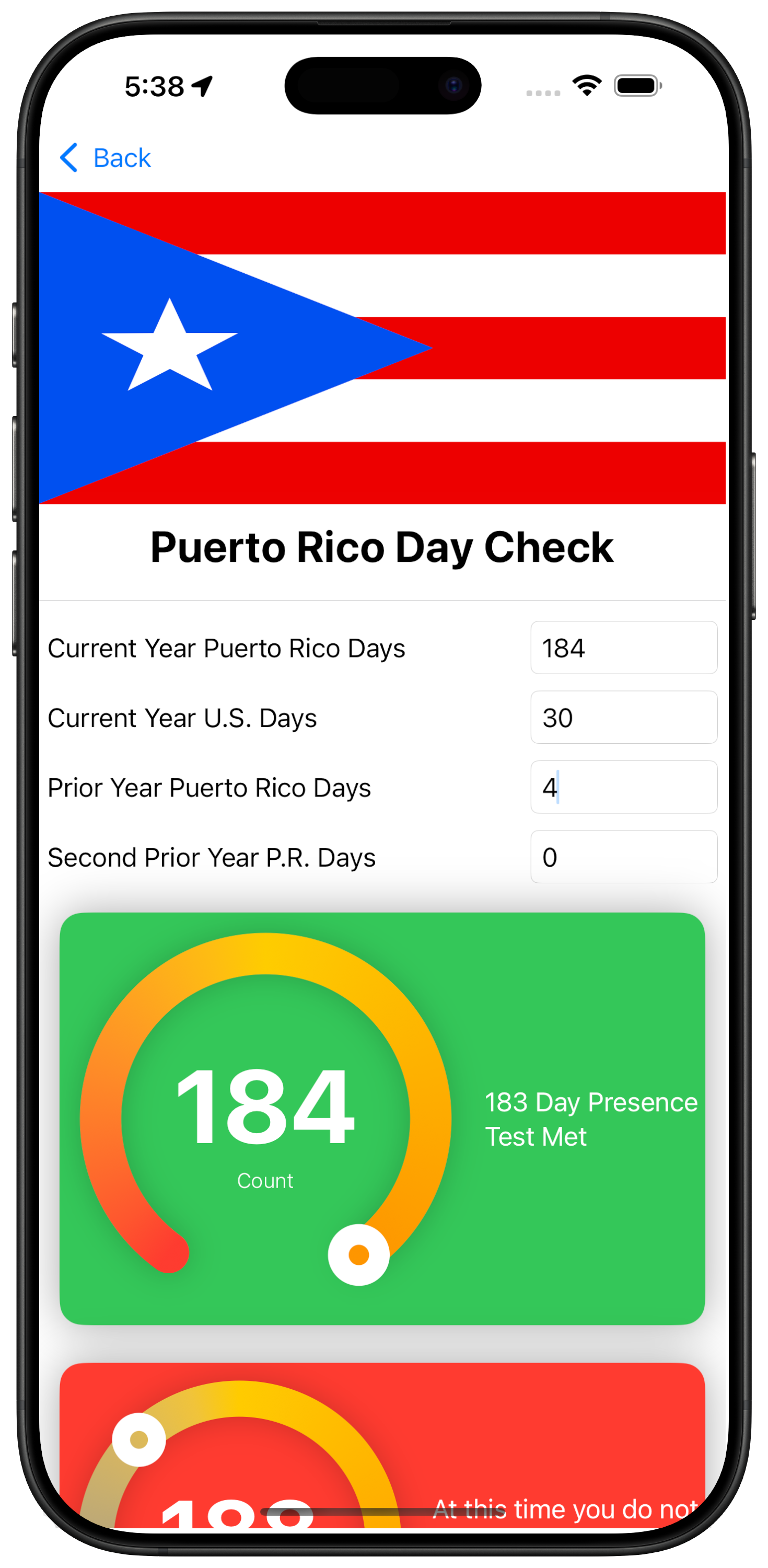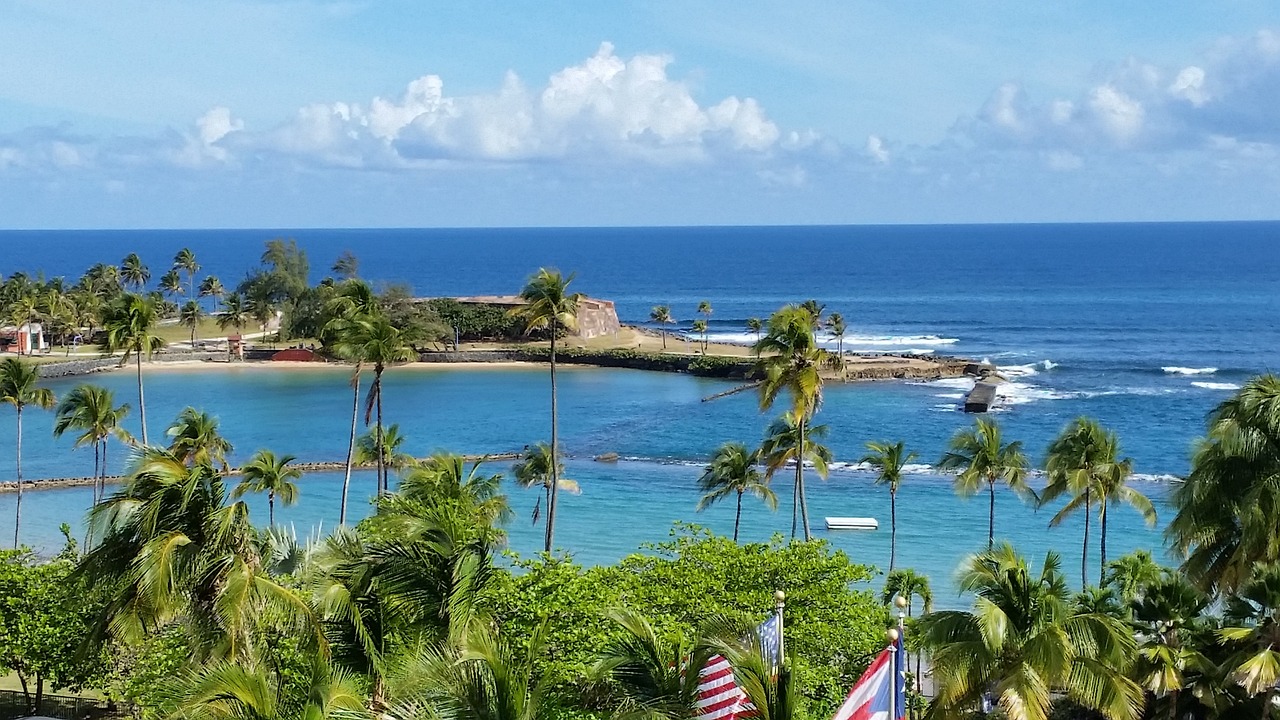In recent years, Puerto Rico has been a popular location for U.S. citizens to relocate to. A main attraction has been the generous 100% tax exemptions for Puerto Rico source interest and dividends. Capital gains (to the extent accrued after attaining Puerto Rico residency) also benefit from a 100% tax exemption from both U.S. and Puerto Rico taxation. See 26 U.S.C. § 933 (Puerto Rico source income of bona fide Puerto Rico resident generally exempt from U.S. income tax) ; Puerto Rico Act 22 (now part of Act 60). Even if capital gains accrued prior to attaining Puerto Rico residency and remain subject to U.S. tax for 10 years after attaining Puerto Rico reidency, there may be significant tax savings if additional capital gain accrues after attaining Puerto Rico residency (since gains accrued after attaining Puerto Rico residency can benefit from the 100% tax exemption).
Puerto Rico is one of fourteen U.S. territories or possessions, only 5 of which are permanently inhabited (Puerto Rico, Guam, U.S. Virgin Islands, American Samoa and Northern Mariana Islands). The Internal Revenue Code has different tax rules for residents of Puerto Rico than it does for residents of the fifty U.S. states. Section 933 of the U.S. Internal Revenue Code provides that income derived from sources within Puerto Rico by an individual who is a resident of Puerto Rico generally will be excluded from U.S. gross income and exempt from U.S. taxation. See 26 U.S.C. § 933. Internal Revenue Code Section 933 does not exempt residents of Puerto Rico from paying U.S. federal taxes on U.S. source income and foreign source income. In general, dividends are sourced to the location of the payor corporation. See 26 U.S.C. § 861(a)(2). Interest amounts are sourced to the residence or country of incorporation of the obligor. See 26 U.S.C. § 861(a)(1)
Puerto Rico Residency Test
An individual is generally considered a tax resident of Puerto Rico if three tests are met. First, the individual must be physically present in Puerto Rico for at least 183 days during the taxable year or satisfy one of the other four presence tests (the “presence test”). Second, the individual must not have a tax home outside of Puerto Rico during the taxable year. Third, the individual must not have a “closer connection” to the United States or a foreign country other than to Puerto Rico during the taxable year. The other four presence tests (only one of which needs to be met if the 183 day test is not met) are: (i) You were present in Puerto Rico for at least 549 days during the 3-year period that includes the current tax year and the 2 immediately preceding tax years. During each year of the 3-year period, you must also be present in the possession for at least 60 days. (ii) You were present in the United States for no more than 90 days during the tax year. (iii) You had $3,000 or less of earned income from U.S. sources and were present for more days in Puerto Rico than in the United States during the tax year. (iv) You had no significant connection to the United States during the tax year to the United States during the year (that is, no spouse or minor child, home, or current voter registration in the U.S.). 26 U.S.C. § 937(a)(2); Treasury Regulation § 1.937-1. An individual is considered to have a significant connection to the U.S. under this last alternaitve presence Test if one of three tests are met: (1) the individual has a permanent home in the U.S.; (2) the individual has a current voter registration in any political subdivision of the U.S.; or (3) the individual has a spouse or child under the age of 18 whose principal place of residence is in the U.S. unless the child is living in the U.S. with a custodial parent under a custodial decree or the child is in the U.S. as a student. A permanent home includes a furnished room or an apartment that may be either owned or rented. If the place is not occupied for long durations, it is considered a permanent home. Under these rules, the rental property can be treated as a non-permanent home if the taxpayer does not use any portion of it as a residence during the taxable year. Treas. Reg. §1.937-1(c)(5).
Presense in Puerto Rico at any time during a day counts as a day in Puerto Rico for these day count tests. 26 U.S.C. § 7701(b)(7)(A)("an individual shall be treated as present ... on any day if such individual is physically present... at any time during such day"); 26 U.S.C. § 937(a)(2); Treasury Regulation § 1.937-1. This is consistent with the rules in many other jurisdictions. If, during a single day, you were physically present in the United States and Puerto Rico, that day is counted as a day of presence in Puerto Rico. If you leave Puerto Rico for certain qualifying medical treatments for your or certain family members or due to national evacuation orders or major disasters, those days can also count as days in Puerto Rico. See Treasury Regulation § 1.937-1.
Under the tax home test, you generally cannot have a tax home outside the possession during any part of the tax year. Your tax home is your regular or main place of business, employment, or post of duty regardless of where you maintain your family home. If you do not have a regular or main place of business because of the nature of your work or because you are not engaged in a trade or business, then your tax home is the place where you regularly live. If you do not fit either of these categories, you are considered an itinerant and your tax home is wherever you work.
You meet the closer connection test if you do not have a closer connection to the United States or a foreign country than to the U.S. possession (that is Puerto Rico here). You are considered to have a closer connection to a possession (Puerto Rico) than to the United States or to a foreign country if you have maintained more significant contacts with the possession(s) than with the United States or foreign country. Significant contacts that may be considered include the following. The location of:
- Your permanent home;
- Your family;
- Your current social, political, cultural, professional, or religious affiliations;
- Where you conduct your routine personal banking activities;
- The jurisdiction in which you hold a driver's license;
- Charitable organizations to which you contribute; and
- The place of residence you designate on forms and documents.
Your connections to the possession will be compared to the total of your connections with the United States and foreign countries. Your answers to the questions on Form 8898, Part III, will help establish the jurisdiction to which you have a closer connection.
IRS Form 8898 Filing Requirement
If you become or cease to be a bona fide resident of Puerto Rico, in many instances, you must file IRS Form 8898 with the U.S. Internal Revenue Service to comply with Section 937(c) of the Internal Revenue Code. You must file Form 8898 for the tax year in which you meet both of the following conditions. (a) Your worldwide gross income in that tax year is more than $75,000 and (b) You meet one of the following: (i) You take a position for U.S. tax purposes that you became a bona fide resident of Puerto Rico after a tax year for which you filed a U.S. income tax return as a citizen or resident of the United States but not as a bona fide resident of Puerto Rico. (ii) You are a citizen or resident of the United States who takes the position for U.S. tax purposes that you ceased to be a bona fide resident of Puerto Rico after a tax year for which you filed an income tax return (with the IRS, Puerto Rico tax authorities, or both) as a bona fide resident of Puerto Rico. (iii) You take the position for U.S. tax purposes that you became a bona fide resident of Puerto Rico after a tax year for which you were required to file an income tax return as a bona fide resident of the U.S. Virgin Islands, Guam, or the CNMI.
Residency Day Count Tracking for Puerto Rico
As should be apparent from this discussion, day count tracking is a critical factor in establishing that you are bona fide resident of Puerto Rico. The Domicile365 App has been designed to provide precise day count tracking for individuals and enterprises, and has a specific set of Puerto Rico tracking features to assist in monitoring your day counts for the presence test. Set up specific day count alerts for Puerto Rico in the App. For more information on the Domicile365 App and its day count tracking features, please see our software page and download the Domicile365 App . Available for Apple and Android devices.

Importance of Careful Compliance
It is important that these issues be properly considerated and analyzed. The U.S. Internal Revenue Service has indicated that it intends to strictly review these matters and has even brought criminal charges against individuals that have, in their view, flouted these rules. See Indictment. Reports indicate that there are ongoing civil and criminal investigations into taxpayer non-compliance in this area. Most recently, on July 14, 2023, the IRS announced that "We recently identified about 100 high-income individuals claiming benefits in Puerto Rico without meeting the residence and source rules involving U.S. possessions. These wealthy individuals are attempting to avoid U.S. taxation on U.S. source income, and we expect many of these cases to proceed to criminal investigation." See IR-2023-126, July 14, 2023. More recently, the IRS and other U.S. authorities have begun to investigate and bring charges against taxpayers and tax advisors for improperly taking the position that income and gains accrued (either directly or indirectly through pass-through entities such as S corporations and partnerships) prior to commencing Puerto Rico residency could benefit from the exemption from tax. See, e.g., Letter from Senator Wyden to Taxpayer; Chief Counsel Memorandum 2024-05 (December 02, 2024) (concluding that any gain accrued either directly or in S corporations or partnerships prior to commencing Puerto Rico residency is not eligible for exclusion and remains subject to U.S. federal income tax).
Consistent with this increased scrutiny, a December 2025 GAO report finds that the IRS needs to improve its oversight of taxpayers claiming Puerto Rico tax incentives, noting significant gaps in data sharing and compliance verification. The report recommends that the IRS establish routine procedures to obtain taxpayer data from Puerto Rico and actively review cases of potential noncompliance.
This material has been prepared for informational purposes only, and is not intended to provide, and should not be relied on for, tax, legal or accounting advice. You should consult your own tax, legal and accounting advisors regarding these matters.


